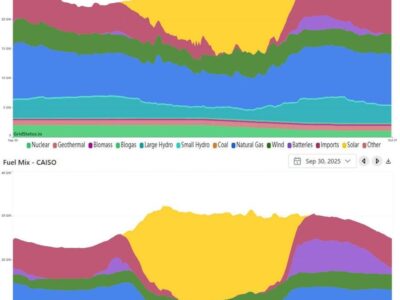The Whipsaw Effect
Get ready for a rough ride, with sudden weather reversals and climate shifts.
Adapting to climate change is an unavoidable necessity, if only because we’ve already baked additional warming into the climate system. Steady predictable changes in climate and weather would be easier to adapt to. Instead, we may well see some very sudden shifts, both in terms of short-term weather and longer-term climate regimes. That has important policy implications.
The shorter-term variety of sudden change was dubbed “whiplash” in a recent article in Yale360. The specific problem is that we might shift rapidly from one type of weather to another. For instance, in California, years of drought may alternate with heavy rain, which perversely increases both the severity of wildfires (more vegetation to burn after wet years) and flooding (less vegetation to hold water after drought years). Rapid changes, such as a warm early spring followed by severe cold, also pose serious challenges for many species. There’s evidence that these rapid weather reversals are on the rise, or in other words, that the volatility of weather is increasing, due to climate change.
The longer-term variety of sudden change is an even more serious worry. Scientists have found some major episodes in earth’s history where the climate shifted very rapidly from one regime to another. The best-understood is a period called the Younger Dryas. Almost 13,000 years ago, gradual warming at the end of the last ice age was interrupted by abrupt cooling in Northern Europe and Eastern North America, with temperatures plunging 7 to 14 °F. After almost a thousand years, the cooling disappeared almost overnight (a decade or less). The shifts have been connected with changes in ocean circulation. Scientists think that our present global warming increases the likelihood of abrupt climate change.
Sudden changes of both kinds pose challenges for climate adaptation. Rapid short-term reversals pose severe challenges for agriculture, a particular worry in countries with a high-proportion of the economy devoted to agriculture or with serious food insecurity. Water systems need to be designed to cope with both droughts and flooding, sometimes in rapid succession. Forests and other ecosystems will be whipsawed by sudden weather reversals. Moreover, increased volatility makes it harder to detect long-term trends, further hampering adaptation.
Abrupt climate change poses even bigger problems. It may be difficult to detect when a long-term regime change has taken place, as opposed to an unusually long run of bad luck. This makes adaptation tougher. It also increases the scale of adaptation efforts required. It is one thing to prepare for more frequent multi-year droughts, but it is quite another to prepare from what may be centuries of arid conditions. Any such shifts in climate regimes, even if they are only regional, could result in severe economic and social disruptions.
In terms of adaptation strategies, the potential for abrupt shifts places a premium on flexibility, providing the ability to respond quickly to the unexpected. Rather than specialized strategies that are optimized to particular problems, there may be a preference for strategies that work reasonably well for many different problems. The analogy would be to generalist species, which do better in periods of rapid change than specialist ones.
And of course, there’s another moral: This is yet another reason for cutting carbon emissions as fast as we can manage. As they say, an ounce of prevention is worth a pound of cure. Or to use another metaphor for the relationship between mitigating climate change in advance or adapting to it after the fact: it’s better to avoid a collision than count on your airbag to save you.
Reader Comments
One Reply to “The Whipsaw Effect”
Comments are closed.







Prof. Farber, considering the increasingly destructive challenges of change we are experiencing today we must not just focus on global warming, which of course is at the top of any list.
The Summer 2020 issue of CALIFORNIA Magazine features a Pandemic Roundtable discussion “What Comes After the Pandemic?” that asks paramount questions of Berkeley’s leading experts on health, public policy, economics, food, science, art, and technology (with my own answers in parenthesis):
What lessons should be learned from this crisis? (We Must Fight Like Hell for the Living)
What old values do we need to jettison? (Us/Them dichotomies, Hofstadter’s Law of Academic Purity)
What new ones should we cultivate? (we must join together socially, politically and economically to Fight Like Hell for The Living),
What technologies or institutions will become ascendant or obsolete? (UC academics must inform, educate and motivate the public, and have two-way conversations to overcome the failures produced by Hofstadter’s Law of Academic Purity that enables inequality, racism and materialism),
What matters most (Life, Liberty and the Pursuit of Happiness including an acceptable environment for all future generations, basic health with controls to prevent/cure disease, free education services, living wages, social opportunity and equality for all with protection from materialism),
and what should we focus on? (all of the above with the greatest sense of urgency to prevent the end of our civilization in this century).
https://alumni.berkeley.edu/california-magazine/summer-2020/what-comes-after-pandemic